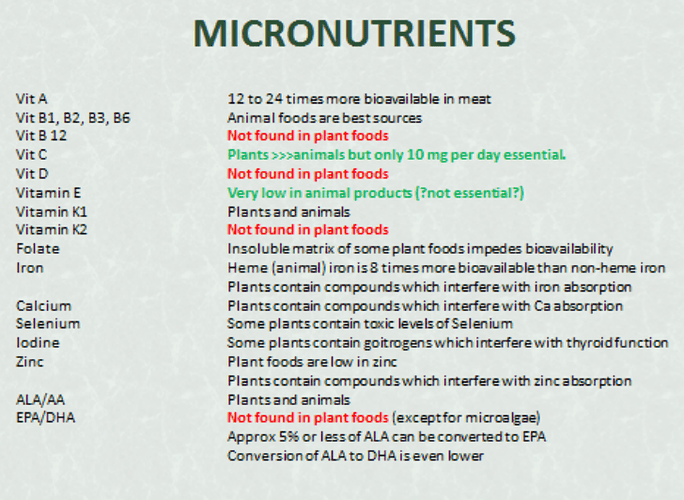Meat!! 
Perhaps this was already posted
Thought I would share any ways
Micronutrients found in MEAT vs Plants comparison
Suspiciously does not include potassium and magnesium, two essential minerals.
can you link to where you found this please? I have been looking for this exact thing. Thanks!
Useful! Bookmarked. I’ve been fretting about doing ZC a bit. I do take some supplements.
K
Whether you are a plant based type, an animal based type or an omnivore, it’s good to have an idea of what foods contain the best sources of what nutrients.
When possible, I’m very much a proponent of letting actual food be your “supplement” (medicine) rather than a pill from a bottle. Yeah, I know that’s not always possible. But I think where a person is able to do so, an omnivorous diet can be just about ideal. (Just an opinion.)
Found on diagnosisdiet.com
From a Reddit old post I believe
It was from a rabbit trail searching 
Dr Georgia Ede MD
Natto, fermented soybeans, is an excellent source of K2. Manganese is hard to get from industrial ag animal products but richly found in oysters and many plants. Men rarely have iron deficiency, too much iron may be more common which is why multi-vitamins for men don’t include iron.
Potassium is Vit K, so that is listed above.
Here is a source of info on magnesium in foods.
So if you eat fish and greens you should get plenty of it,
Vitamin K is not potassium. Vitamin K is a series of menaquinones.
You might be thinking the chemical symbol for potassium. Which is K. Good memory though! 
K
There is a lot to vitamin K2. Anyone interested should check out some of the work done by Chris Masterjohn. As has been said here already there are several menaquinones (9 to be exact) which all compose vitamin K2.
I know “a vegan site” but I like the description explaining K2 (fat soluble form of K) from plants possibly through gut fermentation[1]!
”…Interestingly, if the articles are saying this vitamin can only be obtained by eating animals and their products, and those animals are vegan plant-eaters, then where do scientists think these animals are getting the vitamin to give us?
It is not generally known that leafy green vegetables contain high amounts of Vitamin K. Kale alone contains over 1325% of our daily requirement of Vitamin K, in approximately two cups of this excellent leafy green. Our bodies are able to convert this Vitamin K1 to Vitamin K2. Spinach, broccoli, asparagus, collard greens, Swiss chard, bok choy, peas, parsley and lentils also contain high amounts of Vitamin K. Studies show that Vitamin K and its components are incredibly resilient and can withstand both cooking and freezing, although we consume more nutrients intact by eating fruits and vegetables raw. Bacteria in our intestines convert Vitamin K1 into Vitamin K2. …” …More
footnotes:
[1] Microbial Fermentation “…Fermentation takes place throughout the gastrointestinal tract of all animals, but the intensity of fermentation depends on microbe numbers, which are generally highest in the large bowel. Thus, the large intestine is quantitatively the most important site of fermention, except for species with forestomachs (ruminants). Further, there are major differences in the contribution of fermentation to energy production of different species. In carnivores like dogs and cats, and even in omnivores like humans, fermentation generates rather few calories, but in herbivores, fermentation is a way of life. …” …More
[2] The Ultimate Vitamin K2 Resource - Chris Masterjohn PhD.
Humans don’t have a great fermentative capacity. It’s why we don’t eat like gorillas. Small cecum small colon, low fermentation.
Tasty cows have a rumen. They ferment the grass into useful protein and fat. And convert K1 to the various forms of K2, but predominantly K2-4, which is most common.
Couple resources here would include Dr. Peter Ballerstedt and Kevin Kennedy. Ballerstedt for the ruminant biology and Kennedy for the virtues of proper dairy cow feed and maintenance, WRT K2 in butter (hint: white butter doesn’t have much, if any, and grass fed has more, while his has the most, but isn’t available in the US).
I noticed that about regular butter (it’s whitish and pale looking, looks more like grease with clear circular round globs in it?) compared to organic butter (deep yellow creamy consistency and looks tasty). Thank you for the info!
Vit. B multi, B12, C, E, D, K2,calcium/mag. ,Zinc, Iron,adding ginger. Melatonin, omega 3. Meds: spiralactone, thyroid. Ordered the serrapeptase. I’ll give it a go.
K
There’s nothing wrong with the butter from feed fed cows. It’s just not as rich in beta carotene and various green grass products. K2 being one of those. Plenty of K2 in animal sources.
No, the chemical symbol for potassium is K. It is a mineral, not a vitamin.

